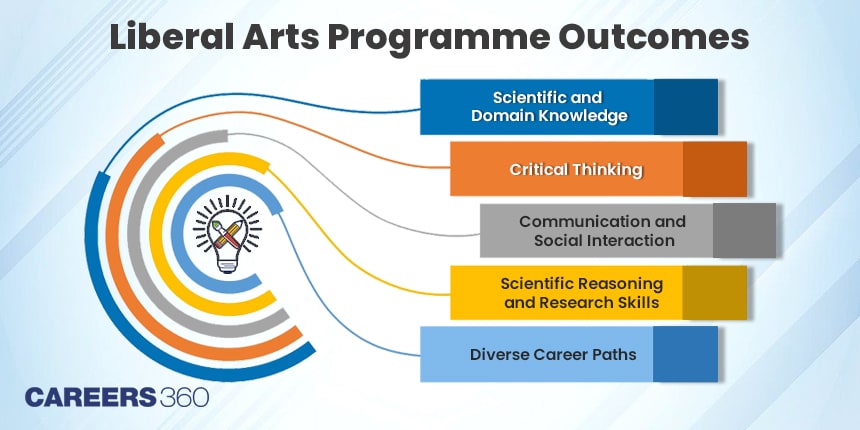While other educational degrees focus on one area; a Liberal Arts degree aims to enhance creativity, research, and critical thinking of students across various domains. Fine and applied arts, Natural sciences, Social sciences, and Humanities are four major areas of study in Liberal Arts. In simple words, a liberal arts education provides interpersonal skills in addition to other technical skills.
 What is a Liberal Arts Degree
What is a Liberal Arts Degree "The purpose of education is to replace an empty mind with an open one” is a famous line quoted by Malcolm S. Forbes. The Indian education system traditionally emphasised on rote learning and neglected the development of both technical and interpersonal skills. Opportunities for research, critical analysis, and creative thinking were also limited.
But National Education Policy (NEP) 2020, has focused on this problem and highlighted the importance of liberal arts subjects in the course curriculum. The NEP aims to integrate the Humanities and Arts with Science, Technology, Engineering and Mathematics (STEM). BA Liberal Arts and MA in Liberal Arts will help students develop the intellectual, social, emotional, and moral traits required for a more holistic and multidisciplinary education.
UPES Online MBA
Apply for Online MBA from UPES
Shoolini University Admissions 2025
NAAC A+ Grade | Ranked No.1 Private University in India (QS World University Rankings 2025)
Degrees Offered in Liberal Arts
Various undergraduate, postgraduate, and doctoral degrees are offered in liberal arts. Below, we have compiled a list of popular liberal arts degrees, and a few of their combinations including the course fees, and provider college details.
Degree | Colleges | Total Fees |
|---|
BA Liberal Arts | Bennett University, Greater Noida | Rs. 14.55 lakhs |
BA History Hons | School of Liberal Studies, UPES, Dehradun | Rs. 7.01 lakhs |
BA Psychology Hons | Graphic Era University, Dehradun | Rs. 3.32 lakhs |
B.Sc Mathematics Hons | School of Liberal Studies, Pandit Deendayal Energy University, Gandhinagar | Rs. 9.84 lakhs |
B.Sc Data Science and Artificial Intelligence Hons | Woxsen University, Hyderabad | - |
B.Sc Applied Mathematics | FLAME University, Pune | Rs. 25.79 lakhs |
MA Economics | Galgotias University, Greater Noida | Rs. 1.22 lakhs |
MA English Language Communication | HITS Chennai | - |
Ph.D Applied Mathematics | Alliance University, Bangalore | Rs. 4.11 lakhs |
Ph.D Psychology | University Institute of Liberal Arts and Humanities, Chandigarh University | Rs. 4.20 lakhs |
Also Read: Liberal Education as per NEP 2020
Benefits of Liberal Arts
Liberal Arts has been an important part of Western education for a long time, and now it has also been included in the curriculum of other regions of the globe including India. There are many pros of Liberal Arts Education that we have below discussed in detail.
Scientific and Domain Knowledge
The main feature or advantage of liberal arts education is its focus on more than one discipline in one degree. This helps students gain knowledge and understanding of multiple disciplines/subjects which enhances their skills and overall personality.
Critical Thinking
Liberal Arts Education emphasises the development of individuals to their fullest potential by enhancing thinking, problem-solving, and social and ethical capacities. It increases an individual’s creativity and critical thinking to encourage decision-making and innovation.
Communication and Social Interaction
Soft skills are something that have been largely neglected in the Indian education system. Liberal arts education specifically addresses this gap and encourages critical thinking and self-expression. It develops listening, writing, and reading skills to easily convey thoughts and ideas.
Scientific Reasoning and Research Skills
This means the ability to make decisions or draw conclusions based on facts, logic, and evidence. It is an important quality to have, as every day we make several decisions without thinking practically. Liberal arts enhance experience-based learning and increase research and analytical skills.
Diverse Career Paths
The main concept of liberal arts education is multi-disciplinary and a holistic education across all streams. This idea ensures the unity and integrity of all knowledge which becomes important when pursuing a career. Liberal Arts gives you a well-rounded understanding of the world and enhance skills such as critical thinking and communication.
Therefore, even if you change your mind about what you want to do after college, you will have a strong foundation to launch yourself into a new career. Career opportunities after pursuing Liberal Arts is huge, graduates can choose from a range of jobs from different industries, such as education, hospitality, business analytics, data analysis, technology, and finance.
